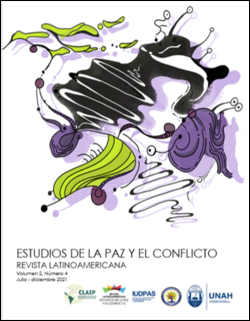Social imaginaries on peace and democracy and their relation to electoral behavior in the 2018 congress and presidency elections in Risaralda
DOI:
https://doi.org/10.5377/rlpc.v2i4.11372Keywords:
Social imaginaries, peace, democracy, political behavior, political participationAbstract
This research analyzes the impact that social imaginaries exerted on peace, democracy and citizenship, which circulated in the discursive practices of political leaders representing parties of the right, center and left, in the context of the elections Congress and Presidency of 2018, in Risaralda and its effect on the preferences and electoral behavior of a group citizens of Risaralda during said elections. Once the field work had been carried out and the information collected was analyzed, a relationship between said discursive practices and the preferences and electoral behavior of this group of voters was evidenced. This research was carried out through the hermeneutic method, using the analysis of discourse on discursive pieces of political leaders related to the categories of democracy, peace and citizenship and the exploration of the preferences and electoral behavior of a group of citizens voting in these elections, through a perception survey. The findings obtained revealed tracers of meaning around the categories of democracy, peace and citizenship, showing that democracy is seen as a utopian meta-story of society, but at the same time, as a form of legitimation of corrupt power, through fragility of the institutions in charge of regulating and guaranteeing electoral processes and the presence of illegal practices that vitiate the electoral system. Likewise, peace emerged seen as an argument of political preference that colonized the public space, through polarized discourses around peace achieved as negotiation or peace achieved as military confrontation. Likewise, a paradoxical ideological convergence was unveiled between the discourses of the right and the left regarding the vision of democracy as a regime of equality and an ideological difference of the discourses of the center versus said democracy, considered as a regime of inclusion. Finally, there are differences between the different political tendencies and between these and citizen perceptions. regarding citizenship as a means of expression of ideals or as a legal instrument for claiming rights.
Downloads
597
HTLM (Español (España)) 93
XLM (Español (España)) 60
EPUB (Español (España)) 127
Downloads
Published
How to Cite
Issue
Section
License
The journal's contents are published under a Creative Commons Attribution 4.0 license (CC BY 4.0). This license allows third parties to share (copy and redistribute the material in any medium or format) and adapt (remix, transform and create from the material for any purpose, including commercial), as long as the authorship and first publication in this journal (Revista Latinoamericana Estudios de la Paz y el Conflicto, Universidad Nacional Autónoma de Honduras - Consejo Latinoamericano de Investigación para la Paz, DOI of the work) is acknowledged, a link to the license is provided and it is indicated if changes have been made to the original. The terms of the license are available online at http://creativecommons.org.




